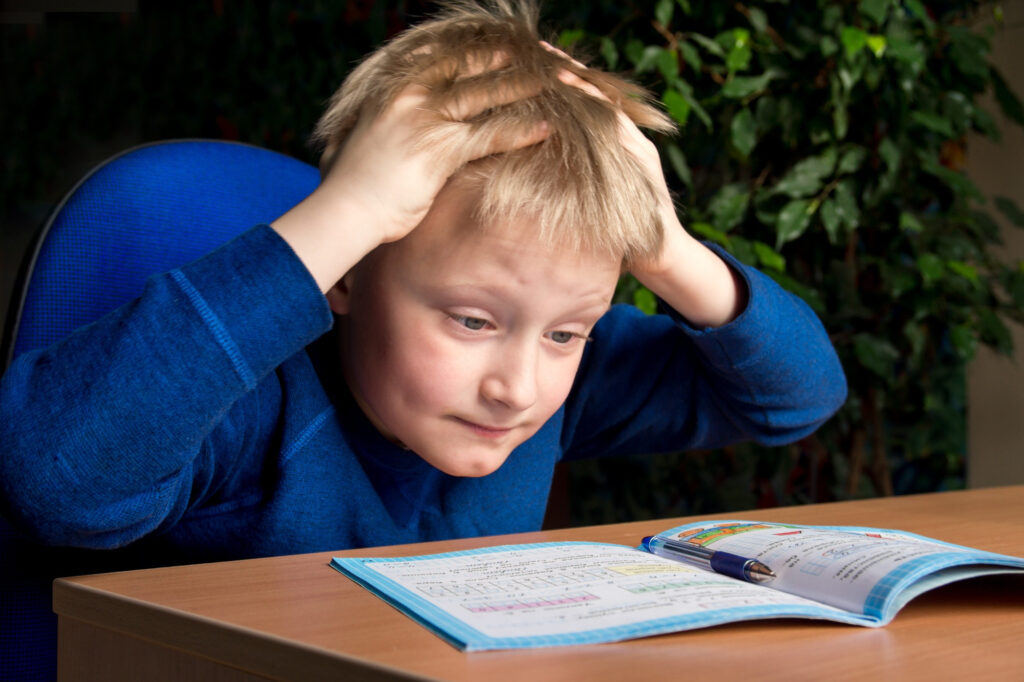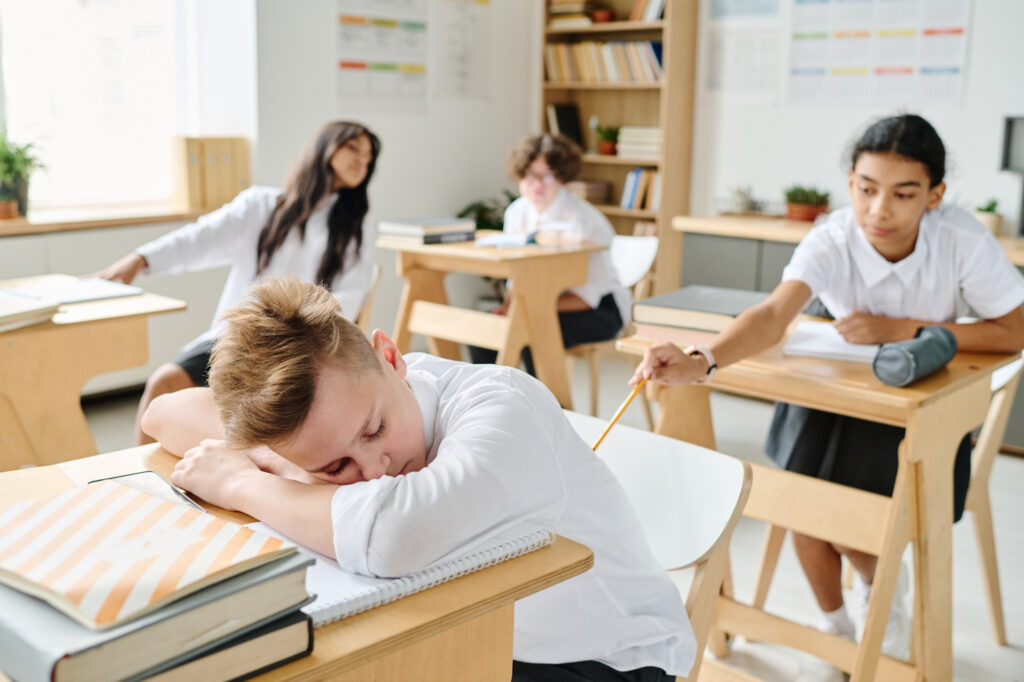What came first, the chicken or the egg? It’s a common debate when it comes to comorbidities that affect our physical health. While many may disagree on which disorder appeared first, and in turn, how one affects the other, there is agreement on the whole of the medical field that ADHD and Sleep Disorders are related.
“ADHD begins in childhood and is present in approximately 5% of children, but more commonly diagnosed in boys. An estimated 25% to 50% of people with ADHD experience sleep problems, ranging from insomnia to secondary sleep conditions. Doctors are beginning to recognize the importance of treating sleep problems, and the positive impact healthy sleep makes on quality of life for ADHD patients and their families.” – SleepFoundation.org [link to: https://www.sleepfoundation.org/mental-health/adhd-and-sleep]
“Attention-deficit/hyperactivity disorder (ADHD) is commonly associated with disordered or disturbed sleep. The relationships of ADHD with sleep problems, psychiatric comorbidities and medications are complex and multidirectional. ADHD may cause sleep problems as an intrinsic feature of the disorder; sleep problems may cause or mimic ADHD; ADHD and sleep problems may interact, with reciprocal causation and possible involvement of comorbidity; and ADHD and sleep problems may share a common underlying neurological etiology.” – NIH Study [link to: https://www.ncbi.nlm.nih.gov/pmc/articles/PMC4340974/]
“Many children and adults who have ADHD also have a sleep disorder—almost three out of four children and adolescents, and up to four out of five adults with ADHD. While adults may seem obviously tired when they are behind on sleep, fatigue in children often looks like exaggerated ADHD symptoms: hyperactivity and impulsivity—sometimes even aggressiveness and acting out.” – CHADD.org [link to: https://chadd.org/about-adhd/adhd-and-sleep-disorders/]
So the two are related, according to several studies and renown sleep and ADHD organizations. So the questions we will examine in this article are:
- How does poor sleep affect adults and children with ADHD?
- How does ADHD symptoms affect sleep quality?
- What is ADHD and What are the Symptoms?
- How can poor sleep exacerbate ADHD symptoms and in contrast, how does better sleep quality improve ADHD symptoms?
What is ADHD and What are the Symptoms?
Attention-deficit/hyperactivity disorder (ADHD) is a developmental disorder that is more than just short attention span. ADHD is not a trivial issue to overlook nor should it be dismissed as mere immaturity that will be outgrown over time. Without proper or adequate treatment, it can have long-term consequences that may negatively impact overall well-being.
“Attention-deficit/hyperactivity disorder (ADHD) is a neurodevelopmental disorder affecting 11 percent of school-age children. Symptoms continue into adulthood in more than three-quarters of cases. ADHD is characterized by developmentally inappropriate levels of inattention, impulsivity and hyperactivity.” – CHADD.org
Some recent statistics about ADHD:
- “7.1 million children (11.4 percent), or approximately 1 in 9 children, have ever been diagnosed with ADHD”.
- “Three out of four children (77.9 percent) had at least one co-occurring condition.” – 2022 National Survey of Children’s Health, Danielson, Claussen, Bitsko
- “Young adults with ADHD between the ages of 23 and 32 are 11 times more likely to be unemployed and not in school. They are 11 times more likely to not enroll in any school vs. enrolling in a 4-year college. They earned close to $2 per hour less in wages than the comparison group.” – Journal of Abnormal Child Psychology (1)
Children and adults with ADHD can exhibit a wide range of symptoms, but the most common and the ones we tend to identify ADHD with are:
- Inattention: Difficulty staying focused, organizing, or staying on task
- Hyperactivity: Excessive movement, fidgeting, tapping, or talking, especially in inappropriate situations
- Impulsivity: Acting without thinking, having difficulty with self-control, or interrupting others

Adults with ADHD
Approximately 10 million adults are affected by attention-deficit/hyperactivity disorder (ADHD). In early adulthood, ADHD is often linked to conditions such as depression, mood or conduct disorders, and substance abuse. Adults with ADHD frequently face challenges in both their work and personal lives due to their symptoms. Many struggle with inconsistent performance in their careers, difficulties managing daily responsibilities, relationship issues, and persistent feelings of frustration, guilt, or self-blame.
Symptoms of ADHD in adults often differ from those seen in children, with a focus on challenges related to attention, organization, and emotional regulation. Here are some common symptoms in adults:
- Adults may struggle to maintain focus on tasks or conversations, becoming easily distracted, trouble following or completing tasks, or misplacing items.
- Time management issues, procrastination, and poor attention to detail are also common struggles. As a result, they may show up late, miss deadlines and forget appointments.
- Disorganization is another hallmark symptom. Adults with ADHD often find it difficult to organize tasks, paperwork, or personal items.
- Impulsivity is also prevalent in adults with ADHD. This may manifest as speaking or acting without thinking, interrupting conversations, impulsive spending, and difficulty waiting their turn.
- Emotional dysregulation is another common challenge. Adults with ADHD often have difficulty managing stress and frustration, leading to mood swings, irritability, and a low tolerance for frustration.
- While hyperactivity tends to be less pronounced in adults, it can still be present. Many feel restless or unable to relax, and may talk excessively or feel the need to keep moving. Fidgeting, tapping, or pacing are also common behaviors in some adults with ADHD.
The Downside of ADHD for Adults
These symptoms often affect relationships and work performance. Adults with ADHD may have frequent conflicts in personal relationships due to impulsivity, disorganization, or emotional outbursts. At work, inconsistent performance, difficulties with daily responsibilities, and missed deadlines can cause problems. These challenges can impact overall well-being and quality of life, making proper diagnosis and treatment essential.

How does ADHD affect sleep in adults? Adults with ADHD suffer from poor sleep quality which only exacerbates their symptoms and also causes long-term health issues including obesity, diabetes, cardiovascular disease, increased risk of cancer, and autoimmune disorders.
Children with ADHD
Children and teens with ADHD typically exhibit symptoms such as inattention, impulsivity, and hyperactivity. These symptoms may evolve as the child ages from toddler to child to preteen to teenager. For example, they might have been more hyperactive as a child but less so during your teenage years. As they grow older, challenges with executive function skills, like finishing homework, turning in assignments, or concentrating on the teacher’s instructions in class, may become more pronounced.
Children with ADHD typically exhibit symptoms in three main categories: inattention, hyperactivity, and impulsivity. These symptoms can vary in intensity, but they generally impact a child’s ability to function in daily life. Here are some of the common signs:
- Inattention and difficulty staying focused on tasks or activities, especially those that require sustained mental effort (e.g., schoolwork), easily distracted, jumping form one task to another, losing things like homework, toys, or school supplies.
- Struggling to follow instructions or complete tasks, such as chores or assignments, as well as struggling to remember and complete multi-step directions.
- Hyperactivity which can include constant fidgeting or squirming when seated, unable to sit for long periods of time, inability to stay quiet or talking excessively when not appropriate, running, climbing or always ‘on the go’ even when instructed to stop.
- Impulsivity including interrupting others, difficult waiting for their turn, acting without thinking or looking before they cross a street.
- Emotional Regulation which means they have difficulty managing emotions, leading to frequent temper tantrums, mood swings, or frustration over small issues.
- Social and School Challenges which includes struggles to make and keep friends, academic struggles, even if they are intelligent, due to issues with focus, completing assignments, or listening to instructions.
The Downside of ADHD in Children
These symptoms may lead to significant challenges in school, at home, and in social situations. ADHD affects a child’s grades and academic achievements which have long term effects on their education and career goals. Their social challenges can lead to increased stress for their parents, their family and cause conflict within the family unit. Their behaviors are impulsive and erratic, so they may be prone to more injuries and accidents.
“Some research shows that young people with untreated ADHD make more visits to the emergency room with injuries.” – WebMD
All of the above symptoms can lead to depression, anxiety, low self-esteem and even suicidal ideations, especially when ADHD is left untreated or the child and parent have not applied the recommended behavioral therapies to effectively manage their busy brains.
How does ADHD affect sleep in children? Children with ADHD also experience poor quality sleep, which can increase their risk for long-term physical and mental disorders, starting in adolescence right into adulthood. It’s not only important to treat the ADHD but also the sleep disorders, which can help reduce symptoms of hyperactivity, cognitive ability and focus, as well as impulsive behaviors.

“A study in Pediatrics found that childhood sleep deficiencies may be linked to future problems, such as decreases in mental functioning that begin as early as adolescence. Increasing evidence also suggests that poor sleep contributes to major health problems, such as obesity.” – Nationwide’s Children.org [link to https://www.nationwidechildrens.org/family-resources-education/family-resources-library/lack-of-sleep-can-harm-a-childs-health]
How Better Sleep Leads to Reduced ADHD Behaviors
First how does ADHD affect sleep quality? Attention deficit hyperactivity disorder (ADHD) can impact sleep in a number of ways, including:
- Sleep duration, so they sleep for shorter periods of time.
- Sleep onset, so they may have trouble falling asleep.
- Sleep quality is reduced by fitful sleep, tossing and turning, and being easily woken up.
- Daytime sleepiness
- High Risk of Sleep disorders including insomnia, restless legs syndrome, and circadian rhythm sleep disorders.
- They can experience hyperfocus on an activity, which can interfere with sleep.
- Delayed circadian rhythm, which means that their body clock is out of sync with the natural cycle of day and night.
Sleep problems can worsen during adolescence and increase with age. Sleep deprivation can be as impairing as other ADHD symptoms combined. On the flip side, diagnosing and effectively treating a patient’s sleep disorder can greatly improve or even eliminate many symptoms of ADHD.
We already know that quality sleep can help improve focus, reduce impulsivity, and lessen hyperactivity.
“Experts are cautiously optimistic that sleep interventions may be key to improving not only sleep, but also ADHD symptoms and the effects of ADHD. Indeed, preliminary studies have found that behavioral sleep interventions improve sleep, ADHD symptoms, daily functioning, behavior, and working memory.” – Sleep Foundation
“There is nothing more gratifying in pediatric sleep medicine than taking a child w/ ADHD, treat/cure their underlying sleep behavior and then see them really shine. Improved behavior, school performance and generally on less medications.” – Mark Rasmus, M.D., Sleep Physician and Medical Director of Everything Sleep Idaho
Improving sleep can help manage ADHD symptoms, though it is not a cure:
- Enhanced focus: Quality sleep can improve attention and concentration.
- Decreased impulsivity: Sufficient rest can help reduce impulsive behavior.
- Lower hyperactivity: Better sleep can lessen hyperactive tendencies.
- Boosted executive functioning: Sleep aids the brain in processing sensory information, leading to improved executive functioning.
- Reduced anxiety and depression: Poor sleep can exacerbate anxiety and depression in individuals with ADHD.
- Enhanced quality of life: Inadequate sleep can negatively impact overall well-being.
- Improved academic performance: Sleep problems can affect the academic success of children with ADHD.
Sleep therapy cannot cure ADHD, but it can help manage its symptoms. ADHD is a neurodevelopmental condition, and while improving sleep can enhance focus, reduce impulsivity, and lessen hyperactivity, it does not address the underlying causes of ADHD. Sleep therapy can be an important part of a broader treatment plan, which may also include behavioral therapy, medication, and lifestyle changes.
Another risk is misdiagnosis since the symptoms for ADHD and poor sleep quality are so similar. There is a possibility that a child or even an adult can be misdiagnosed with ADHD, when they really need sleep therapy for a sleep-related disorder. Since it can be difficult to tell whether these issues are brought on by ADHD or by a lack of sleep, sleep disorders may go undetected. Therefore, experts generally recommend screening patients for sleep problems before prescribing medication for ADHD. It’s recommended that before starting any medication, especially ADHD medications, read the precautions and disclaimers. Most ADHD medications are stimulants so they can raise your blood pressure and speed up your heart rate, as well as cause a host of other symptoms: headaches, upset stomach, decreased appetite, anxiety, minor growth delays, and ironically, difficulty sleeping.
So before you take that route for yourself or your child, make an appointment with Everything Sleep Idaho to discuss your ADHD symptoms, where we play a crucial role in helping individuals assess and address sleep disorders as well as improve their overall sleep quality.
REFERENCES:
- Kuriyan, Aparajita B. et al. (January 2013). Young Adult Educational and Vocational Outcomes of Children Diagnosed with ADHD. Journal of Abnormal Child Psychology 41(1):27–41.








